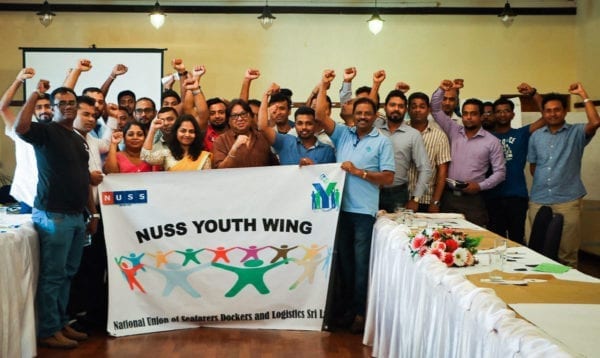Union members in Colombo, Sri Lanka, successfully lobbied for a safer workplace by convincing their company to improve policy guidelines to help prevent gender-based violations in the workplace.

Union members in Sri Lanka celebrate a new workplace policy addressing sexual harassment. Credit: Solidarity Center/Sean Stephens
The effort was inspired by a Solidarity Center awareness-raising training in December on gender-based violence at work in which four workers from the South Asia Gateway Terminal (SAGT)—Ansley De Bruin, Mayura Kanchana, Nilanka Rathnayake and Ruwan Weerasinghe—took part. SAGT operates in Colombo’s shipping port.
“We have spoken to our [human resources] department many times over the past two years on setting a policy against gender-based violence in the workplace,” says Ansley De Bruin, youth wing president of the National Union of Seafarers Sri Lanka (NUSS). “We realized that it would be a hard push to get a code of conduct put in place regarding gender-based violence, so we felt the best thing to push for would be a whistleblower policy.”
After the training, the four participants again met with human resources. Based on their proposal, the organization not only introduced a whistleblower policy a couple of weeks later but also released a separate policy against sexual harassment.

Credit: Solidarity Center/Sean Stephens
The training program outlined incidences that constitute gender-based violence at work and the actions union members can take in supporting the adoption of a global ILO convention (regulation) on gender-based violence in the workplace. It was organized by the National Union of Seafarer’s Sri Lanka (NUSS), along with the International Labor Organization (ILO), International Transport Workers Federation (ITF) and Solidarity Center.
De Bruin says he is grateful SAGT understands its workers’ fundamental rights to a safe, violence-free workplace.
“This is not only a victory for the union but also for the organization and its staff. I would like to thank my organization the South Asia Gateway Terminal for hearing and implementing a system that protects all its staff.”

